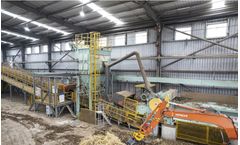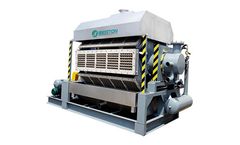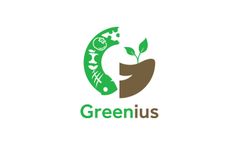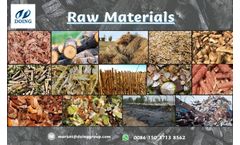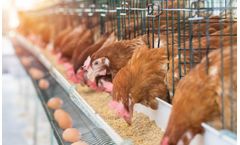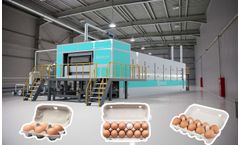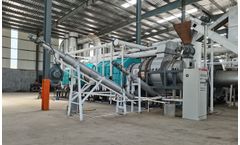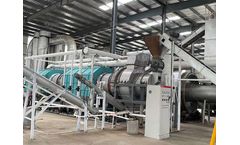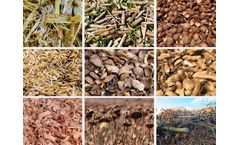Refine by
Farm Waste Articles & Analysis
93 articles found
Dealing with waste resulting from farm activities is a problem no farmer can avoid. ...
The palm oil industry is a cornerstone of agricultural economies in many tropical regions, especially in Southeast Asia and Africa. As the demand for palm oil grows globally, so does the volume of agricultural waste produced—particularly palm kernel shells (PKS). Once considered a low-value byproduct, these shells are now gaining attention for their untapped potential. Through advanced pyrolysis ...
The scalability of manufacturing processes is a key factor for businesses aiming to expand production volumes while maintaining efficiency and quality. A coffee cup tray making machine is an essential tool for manufacturers seeking to optimize their production lines and increase output. This machine not only improves the efficiency of the manufacturing process but also enhances flexibility, ...
1. The "Five Utilization” of Agricultural and Forestry Wastes The "five" utilization of agricultural and forestry wastes is fertilizer, feed, fuel/energy, base material, and raw material. Among them, fertilizer and fuel/energy utilization have the highest emission reductions, accounting for 92.7% of the total emission reductions. Among them, although fuel/energy utilization accounts for ...
Additionally, egg tray machine suppliers will focus on designing machines that can efficiently process a wider range of recyclable materials, including agricultural waste and post-consumer paper. This will contribute to a circular economy by reducing waste and providing manufacturers with a more sustainable raw material source. ...
As cities expand, so does the need for smarter waste management solutions. One such innovative solution is the use of waste to compost machine—machines that turn everyday organic waste into nutrient-rich compost for urban farming. Greenius, a leader in eco-friendly technology, is revolutionizing how urban dwellers approach ...
Agricultural waste, which includes materials such as crop residues, wood chips, and nutshells, can be a valuable resource when converted into high-quality charcoal. This process not only helps in managing waste but also produces a product that has numerous applications, including fuel for cooking, soil amendment, and industrial uses. ...
Common feedstocks include agricultural waste, forestry residues, and even municipal organic waste. Its porous structure and chemical properties make it highly effective for soil improvement and environmental benefits. ...
Waste Management and Circular Economy Using agricultural waste to make biochar presents a sustainable solution to managing biomass waste, transforming it into a valuable product rather than allowing it to accumulate or decay. Waste from crops like rice, corn, and sugarcane can be converted into biochar, turning what would ...
Developing a Cost-Efficient Strategy for Continuous Quality Monitoring of Feed Ingredients Rich-protein grain, cereals, oilseeds and various by-products are the common feed ingredients for poultry and swine. In recent years, farmers worldwide are struggling with the increasing prices of raw materials which resulted in the need to maintain optimal livestock performance in a cost-effective manner. ...
Egg cartons. Those humble cardboard companions that cradle our breakfast essentials. But have you ever stopped to think about their environmental impact? Traditional egg cartons, often made from polystyrene foam, can take centuries to decompose, adding to landfill woes. Thankfully, there's a brighter side to the egg carton story: sustainable paper egg cartons! These eco-friendly options offer a ...
In the realm of sustainable biomass utilization, the production of charcoal from agricultural waste biomass offers a multitude of benefits. From environmental conservation to economic empowerment, this innovative approach to biomass conversion holds promise for addressing pressing challenges while unlocking new opportunities for communities and industries alike. Let's delve into the myriad ...
Heritage Farms, led by manager Allan Smirl for over a decade, has continuously sought innovative ways to improve their operations. In 2014, the farm began a partnership with Decisive Farming to enhance decision-making processes impacting the farm’s ...
The cost of upgrading farms using modern technology can be significant. Fortunately, there are a number of Canadian government grants for farmers, ranchers, and producers to alleviate these financial burdens. Technology plays a major role today in enhancing a farm’s production efficiency, yields and profits over the ...
Introduction Evolution of Agricultural Waste Management The landscape of agricultural waste management has undergone a paradigm shift, driven by the need for sustainable practices. ...
This section unveils the symbiotic relationship between agricultural planting and the quest for innovative charcoal production solutions, ushering in an era where farming residues become the backbone of renewable energy. The Bounty of Agricultural Residues Jute Sticks: Fibrous Riches from Harvest As farmers harvest jute, a fibrous goldmine is left behind. ...
IntroductionCharcoal, a ubiquitous element in households and industries alike, has long been associated with deforestation and environmental degradation. However, a paradigm shift is underway as we explore the transformative potential of utilizing agricultural waste for charcoal production. This article delves into the impact of this innovative approach on sustainable agricultural development, ...
This not only saves costs but also mitigates the environmental impact of excessive chemical use. Sustainable farming practices, such as reduced tillage and organic farming, are encouraged, leading to healthier ecosystems and more resilient agricultural systems. ...
In this article, we delve into the world of agricultural waste disposal and how charcoal making machines play a pivotal role in transforming waste into a valuable resource. ...
In the pursuit of sustainable biomass management, two distinctive approaches have garnered attention: biochar production and composting. Both methods seek to convert organic matter into valuable resources, but they differ significantly in their mechanisms and outcomes. This article delves into the world of biochar production and composting, exploring the advantages of choosing biochar production ...



